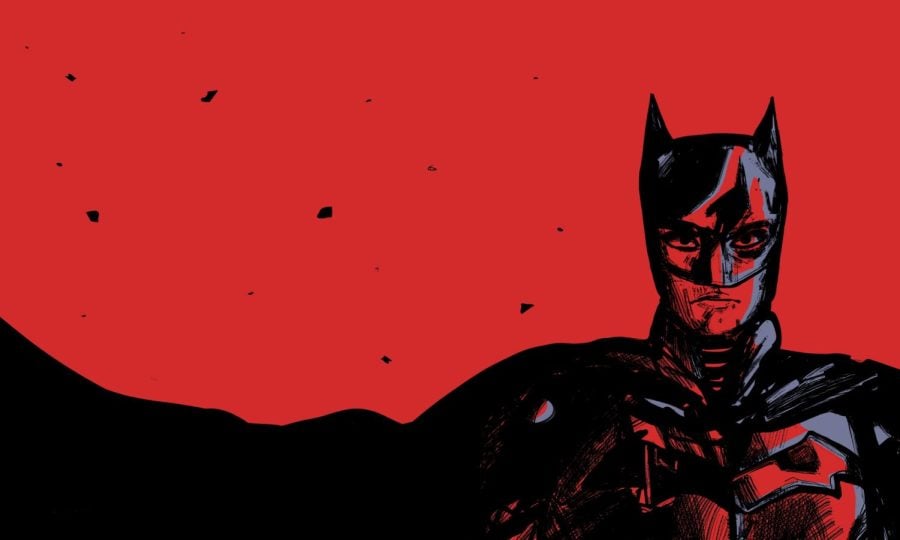Reel Thoughts: Matt Reeves’ ‘The Batman’ finds success as dark detective story
“The Batman,” starring Robert Pattinson, is a gritty noir take on the classic franchise.
March 30, 2022
This article contains spoilers.
“The Batman” is not a superhero movie. Rather, it’s a gritty detective story about a man unraveling the sins of his father, his family and his city as the world he grew up in crumbles around him.
Directed by Matt Reeves, this is the first film that sees Bruce Wayne (Robert Pattinson) introduce himself not as the superhero we all know and love, but rather as “vengeance.” Pattinson’s iteration of the Dark Knight is a darker take on the classic character, with his somber self-introduction uttered just moments after nearly beating a criminal in clown paint to death.
This version of Batman has little interest in playing the role of Bruce Wayne. When Alfred Pennyworth (Andy Serkis) tries to convince him to meet with some executives from Wayne Enterprises — which Alfred calls his family’s legacy — Wayne declines, saying his work as the Batman is his true legacy.
This film sees Wayne reflecting through a journal entry on his second year as Gotham City’s masked vigilante. This provides the audience with a glimpse into Wayne’s inner thoughts through Pattinson’s somber tone and husky voice.
Set to “Something in the Way” by Nirvana, we see the city slowly becoming more and more chaotic in the face of crime and violence through montages. This establishes the tone and aesthetic of Reeves’ “The Batman,” creating an effect reminiscent of other noir films.
“The Batman” pairs a darker take on the caped crusader with a unique take on one of the character’s most beloved and enigmatic villains, the Riddler (Paul Dano).
Dano’s Riddler, Edward Nashton, seeks to expose the sins of Gotham City by targeting its corrupt politicians and public figures. The cryptic messages addressed to The Batman that Nashton leaves at each murder site set up a web of clues Bruce Wayne must solve.
This Riddler is a stark contrast from past portrayals of the character. While Jim Carrey’s performance in “Batman Forever” was admirable, Dano’s Riddler has a much more compelling backstory that fuels his desire to hunt down Gotham’s privileged elite.
Nashton’s actions are grounded in the suffering of a poor orphan who watched Bruce Wayne grow up with luxury while his pain was exacerbated by the mistakes of the Wayne family.
The one authority figure who seems to be incorruptible is Jim Gordon (Jeffrey Wright). Following past controversy surrounding whether characters like Spider-Man or James Bond could be Black, it’s refreshing to see a Black actor play Gotham’s police commissioner and one of Batman’s most trusted allies.
The same can be said for Zoë Kravitz, who is brilliant as Catwoman and was turned down for the same role years earlier due to her race.
Wright brings an understated yet thoughtful performance to the character which instantly explains why he’s the only person Batman trusts.
There are few filmmakers on the planet that could be trusted to take on a task like reviving Batman after the success of “The Dark Knight,” but Reeves has done just that. By exploring the mental state of the detective behind the caped crusader, Reeves crafts an original story that captures the essence of Batman while examining the dark past of the hopeless city that is Gotham.
“Our scars can destroy us, even after the physical wounds have healed,” says Pattinson’s Batman towards the end of the film. “But if we survive them, they can transform us. They can give us the power to endure, and the strength to fight.”
Email: [email protected]
Twitter: @andresbuena01
Related Stories:
— Reel Thoughts: “Money Heist” brings the action in its final season
— Reel Thoughts: “Emily in Paris” was not written to be taken seriously
— Reel Thoughts: “Dune” is definitely sand power, but does that matter for Hollywood?


